Home | Category: Moses / Moses
MOSES AND THE EXODUS

Jews escape from Egypt
Even though Moses was brought up as an Egyptian prince, he sympathized with the plight of his people. After Moses was forced to flee Egypt for killing and an Egyptian slavemaster about to kill a Hebrew slave, God appeared to Moses in a burning bush in the desert and ordered Moses to return to Egypt and demand the pharaoh to set the Children of Israel free. God ordered Moses to return to Egypt and demand the Pharaoh to set the Children of Israel free. [Source: Paul Mendes-Flohr Worldmark Encyclopedia of Religious Practices, 2000s, Encyclopedia.com]
After the Pharaoh refused God unleashed 10 plagues upon the Egyptians. The pharaoh then freed the Children of Israel but they were forced to flee Egypt, which they did under Moses' leadership, marking the beginning of the Exodus. As the Hebrews were crossing the desert, the pharaoh went against his word, and sent an army to recapture them. At the Red Sea, the waters miraculously parted to allow the Israelites to cross but the pursuing army drowned as the waters engulfed them. [For a total of 40 years Moses led his people through the wilderness, until they finally came to the Promised Land. Before being able to enter Moses died at the age of 120.
After the 10th plague and the observation of the first Passover, Moses and the Israelites embarked on their Exodus from the Land of Goshen in the Nile Delta in Egypt to the Promised Land. The Israelites at first were reluctant to have Moses lead them. There is little evidence of the Exodus. There are accounts of Egyptian raids into Palestine that brought back captives in the 12th century B.C. but there was no record of huge masses of people escaping and crossing the Sinai.
According to the Bible, the Israelites numbered some 600,000 adult males and their families: perhaps two million people. That is an awful lot of people to wandering around a desert with barely enough food to feed goats and Bedouins. Some scholar believe the 600,000 figures was actually taken from a census in Israel centuries later. Other scholars say the Hebrew word “eleph” which translate to thousand, may in fact mean "family." Some 600 families, with about a total of 1,500 people, seems like a more reasonable number.☼
Paul Mendes-Flohr wrote in the Worldmark Encyclopedia of Religious Practices: According to the Bible, the history of the Israelites was determined by their relationship to God, which was sealed by two events. The first was the Exodus of the enslaved Israelites from Egypt, where they had settled after a famine had blighted the Promised Land. The deliverance of the Children of Israel from servitude marked their birth as a nation. Previously they had been a loosely knit group of 12 tribes, descendants of Abraham. God's intervention on their behalf was understood to be an act of love and undeserved grace, solely the fulfillment of a promise he had made. Acknowledging that its existence was owed to God, Israel was henceforth beholden to him. The Exodus story, which the Israelites were enjoined to remember through constant retelling, thus constituted Israel's understanding of itself as a people destined to serve God in love and gratitude. [Source: Paul Mendes-Flohr Worldmark Encyclopedia of Religious Practices, 2000s Encyclopedia.com]
Websites and Resources: Bible and Biblical History: Bible Gateway and the New International Version (NIV) of The Bible biblegateway.com ; King James Version of the Bible gutenberg.org/ebooks ; Bible History Online bible-history.com ; Biblical Archaeology Society biblicalarchaeology.org ; Judaism Virtual Jewish Library jewishvirtuallibrary.org/index ; Judaism101 jewfaq.org ; torah.org torah.org ; Chabad,org chabad.org/library/bible ; Internet Jewish History Sourcebook sourcebooks.fordham.edu Christianity: BBC on Christianity bbc.co.uk/religion/religions/christianity ; Christian Classics Ethereal Library www.ccel.org ; Sacred Texts website sacred-texts.com ; Internet Ancient History Sourcebook: Christian Origins sourcebooks.fordham.edu ; Biblical Images: Bible in Pictures creationism.org/books ; Bible Blue Letter Images blueletterbible.org/images ; Biblical Images preceptaustin.org
RECOMMENDED BOOKS:
“Exodus” by Richard Elliott Friedman Amazon.com ;
"Exodus and Numbers: The Exodus from Egypt" (MacArthur Bible Studies)
by John F. MacArthur Amazon.com ;
“Moses: A Life” by Jonathan Kirsh Amazon.com ;
“Great Lives: Moses: A Man of Selfless Dedication” by Charles R. Swindoll, Maurice England, et al. Amazon.com ;
“Moses: In the Footsteps of the Reluctant Prophet” by Adam Hamilton Amazon.com ;
“Moses and Monotheism” by Sigmund Freud Amazon.com ;
“Gregory of Nyssa: The Life of Moses” (HarperCollins Spiritual Classics Amazon.com ; “Ten Commandments” (film, DVD by
Cecil B. DeMille, with Charleston Heston) Amazon.com ;
“Prince of Egypt” (Dreamworks animation with the voice of Moses supplied by Val Kilmer and his friend Ramses by Ralph Fiennes) Amazon.com
Routes of the Exodus
The route between Goshen in the Nile Delta in Egypt and the Promised Land in Canaan (Israel) crossed the Sinai Peninsula. Some scholars believe that Moses followed a northern route across the Sinai. Other say he took a southern route. Both point to the miracles of manna and quails to back up their argument.
Most of the geographic location described on the Books of Exodus through Deuteronomy are impossible to locate on a map. The journey began on the Nile Delta and ended on Mount Nebo in Jordan, a distance roughly equivalent to the distance between New York and Washington D.C.☼
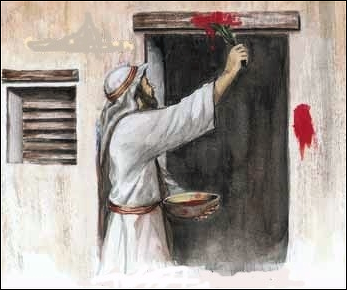
Passover house markings
Most scholars believe that if the Exodus indeed took place the Israelites left the Nile Delta and entered the Sinai where the Suez Canal is today, which completely bypasses the Red Sea. Kadesh-barnes, where the Israelites stopped for 38 years before entering the Promised Land, is thought to be the oasis of Ayn al Qudayrat, near the Israeli city of Beersheba.
There are four major routes between Goshen and Kadesh-barnes. The Northern routes passes through a Sea of Reeds in the Mediterranean. The other three pass through a Sea of Reeds near the present-day Suez Canal. Of these, one route reaches southern Sinai while the other two pass through the center of the Sinai. From Kadesh-Barnea to Mt. Nebo the are two major routes
Proponents of the southern route theory say after skirting the Red Sea, the Israelites headed southeast to Great Bitter Lake and Little Bitter Lake, which are full of reeds and equated with the "Reed Sea." Mt. Sinai, where Moses received the Ten Commandments, is believed to be a 7,497-foot purple granite peak long called Gebel in the southern Sinai.
Passover Story
Exodus 11:6 And there shall be a great cry throughout all the land of Egypt, such as there was none like it, nor shall be like it any more. 11:7 But against any of the children of Israel shall not a dog move his tongue, against man or beast: that ye may know how that the LORD doth put a difference between the Egyptians and Israel. 11:8 And all these thy servants shall come down unto me, and bow down themselves unto me, saying, Get thee out, and all the people that follow thee: and after that I will go out. And he went out from Pharaoh in a great anger... [Source: King James Version of the Bible, gutenberg.org]
...12:1 And the LORD spake unto Moses and Aaron in the land of Egypt saying, 12:2 This month shall be unto you the beginning of months: it shall be the first month of the year to you. 12:3 Speak ye unto all the congregation of Israel, saying, In the tenth day of this month they shall take to them every man a lamb, according to the house of their fathers, a lamb for an house: 12:4 And if the household be too little for the lamb, let him and his neighbour next unto his house take it according to the number of the souls; every man according to his eating shall make your count for the lamb. 12:5 Your lamb shall be without blemish, a male of the first year: ye shall take it out from the sheep, or from the goats: 12:6 And ye shall keep it up until the fourteenth day of the same month: and the whole assembly of the congregation of Israel shall kill it in the evening.
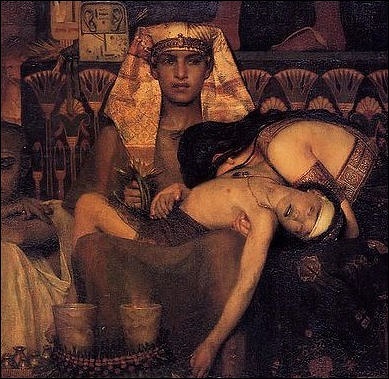
death of the Pharaoh's firstborn son
12:7 And they shall take of the blood, and strike it on the two side posts and on the upper door post of the houses, wherein they shall eat it. 12:8 And they shall eat the flesh in that night, roast with fire, and unleavened bread; and with bitter herbs they shall eat it. 12:9 Eat not of it raw, nor sodden at all with water, but roast with fire; his head with his legs, and with the purtenance thereof. 12:10 And ye shall let nothing of it remain until the morning; and that which remaineth of it until the morning ye shall burn with fire.
12:11 And thus shall ye eat it; with your loins girded, your shoes on your feet, and your staff in your hand; and ye shall eat it in haste: it is the LORD's passover. 12:12 For I will pass through the land of Egypt this night, and will smite all the firstborn in the land of Egypt, both man and beast; and against all the gods of Egypt I will execute judgment: I am the LORD. 12:13 And the blood shall be to you for a token upon the houses where ye are: and when I see the blood, I will pass over you, and the plague shall not be upon you to destroy you, when I smite the land of Egypt. 12:14 And this day shall be unto you for a memorial; and ye shall keep it a feast to the LORD throughout your generations; ye shall keep it a feast by an ordinance for ever. 12:15 Seven days shall ye eat unleavened bread; even the first day ye shall put away leaven out of your houses: for whosoever eateth leavened bread from the first day until the seventh day, that soul shall be cut off from Israel. 12:16 And in the first day there shall be an holy convocation, and in the seventh day there shall be an holy convocation to you; no manner of work shall be done in them, save that which every man must eat, that only may be done of you. 12:17 And ye shall observe the feast of unleavened bread; for in this selfsame day have I brought your armies out of the land of Egypt: therefore shall ye observe this day in your generations by an ordinance for ever.
12:18 In the first month, on the fourteenth day of the month at even, ye shall eat unleavened bread, until the one and twentieth day of the month at even. 12:19 Seven days shall there be no leaven found in your houses: for whosoever eateth that which is leavened, even that soul shall be cut off from the congregation of Israel, whether he be a stranger, or born in the land. 12:20 Ye shall eat nothing leavened; in all your habitations shall ye eat unleavened bread.
12:21 Then Moses called for all the elders of Israel, and said unto them, Draw out and take you a lamb according to your families, and kill the passover. 12:22 And ye shall take a bunch of hyssop, and dip it in the blood that is in the bason, and strike the lintel and the two side posts with the blood that is in the bason; and none of you shall go out at the door of his house until the morning. 12:23 For the LORD will pass through to smite the Egyptians; and when he seeth the blood upon the lintel, and on the two side posts, the LORD will pass over the door, and will not suffer the destroyer to come in unto your houses to smite you. 12:24 And ye shall observe this thing for an ordinance to thee and to thy sons for ever. 12:25 And it shall come to pass, when ye be come to the land which the LORD will give you, according as he hath promised, that ye shall keep this service. 12:26 And it shall come to pass, when your children shall say unto you, What mean ye by this service? 12:27 That ye shall say, It is the sacrifice of the LORD's passover, who passed over the houses of the children of Israel in Egypt, when he smote the Egyptians, and delivered our houses. And the people bowed the head and worshipped.
12:28 And the children of Israel went away, and did as the LORD had commanded Moses and Aaron, so did they. 12:29 And it came to pass, that at midnight the LORD smote all the firstborn in the land of Egypt, from the firstborn of Pharaoh that sat on his throne unto the firstborn of the captive that was in the dungeon; and all the firstborn of cattle. 12:30 And Pharaoh rose up in the night, he, and all his servants, and all the Egyptians; and there was a great cry in Egypt; for there was not a house where there was not one dead.
Jews Flee Egypt
Exodus 12:31: And he called for Moses and Aaron by night, and said, Rise up, and get you forth from among my people, both ye and the children of Israel; and go, serve the LORD, as ye have said. 12:32 Also take your flocks and your herds, as ye have said, and be gone; and bless me also. 12:33 And the Egyptians were urgent upon the people, that they might send them out of the land in haste; for they said, We be all dead men. 12:34 And the people took their dough before it was leavened, their kneadingtroughs being bound up in their clothes upon their shoulders. 12:35 And the children of Israel did according to the word of Moses; and they borrowed of the Egyptians jewels of silver, and jewels of gold, and raiment: 12:36 And the LORD gave the people favour in the sight of the Egyptians, so that they lent unto them such things as they required. And they spoiled the Egyptians. [Source: King James Version of the Bible, gutenberg.org]
12:37 And the children of Israel journeyed from Rameses to Succoth, about six hundred thousand on foot that were men, beside children. 12:38 And a mixed multitude went up also with them; and flocks, and herds, even very much cattle. 12:39 And they baked unleavened cakes of the dough which they brought forth out of Egypt, for it was not leavened; because they were thrust out of Egypt, and could not tarry, neither had they prepared for themselves any victual. 12:40 Now the sojourning of the children of Israel, who dwelt in Egypt, was four hundred and thirty years. 12:41 And it came to pass at the end of the four hundred and thirty years, even the selfsame day it came to pass, that all the hosts of the LORD went out from the land of Egypt...

Jews fleeing Egypt
...13:17 And it came to pass, when Pharaoh had let the people go, that God led them not through the way of the land of the Philistines, although that was near; for God said, Lest peradventure the people repent when they see war, and they return to Egypt: 13:18 But God led the people about, through the way of the wilderness of the Red sea: and the children of Israel went up harnessed out of the land of Egypt. 13:19 And Moses took the bones of Joseph with him: for he had straitly sworn the children of Israel, saying, God will surely visit you; and ye shall carry up my bones away hence with you.
13:20 And they took their journey from Succoth, and encamped in Etham, in the edge of the wilderness. 13:21 And the LORD went before them by day in a pillar of a cloud, to lead them the way; and by night in a pillar of fire, to give them light; to go by day and night: 13:22 He took not away the pillar of the cloud by day, nor the pillar of fire by night, from before the people.
14:1 And the LORD spake unto Moses, saying, 14:2 Speak unto the children of Israel, that they turn and encamp before Pihahiroth, between Migdol and the sea, over against Baalzephon: before it shall ye encamp by the sea. 14:3 For Pharaoh will say of the children of Israel, They are entangled in the land, the wilderness hath shut them in. 14:4 And I will harden Pharaoh's heart, that he shall follow after them; and I will be honoured upon Pharaoh, and upon all his host; that the Egyptians may know that I am the LORD. And they did so.
Egyptians Pursue the Jews
Exodus 14:5 And it was told the king of Egypt that the people fled: and the heart of Pharaoh and of his servants was turned against the people, and they said, Why have we done this, that we have let Israel go from serving us? 14:6 And he made ready his chariot, and took his people with him: 14:7 And he took six hundred chosen chariots, and all the chariots of Egypt, and captains over every one of them. 14:8 And the LORD hardened the heart of Pharaoh king of Egypt, and he pursued after the children of Israel: and the children of Israel went out with an high hand. [Source: King James Version of the Bible, gutenberg.org]
14:9 But the Egyptians pursued after them, all the horses and chariots of Pharaoh, and his horsemen, and his army, and overtook them encamping by the sea, beside Pihahiroth, before Baalzephon. 14:10 And when Pharaoh drew nigh, the children of Israel lifted up their eyes, and, behold, the Egyptians marched after them; and they were sore afraid: and the children of Israel cried out unto the LORD.

Pharaoh Pursues the Israelites by Tissot
14:11 And they said unto Moses, Because there were no graves in Egypt, hast thou taken us away to die in the wilderness? wherefore hast thou dealt thus with us, to carry us forth out of Egypt? 14:12 Is not this the word that we did tell thee in Egypt, saying, Let us alone, that we may serve the Egyptians? For it had been better for us to serve the Egyptians, than that we should die in the wilderness.
14:13 And Moses said unto the people, Fear ye not, stand still, and see the salvation of the LORD, which he will shew to you to day: for the Egyptians whom ye have seen to day, ye shall see them again no more for ever. 14:14 The LORD shall fight for you, and ye shall hold your peace. 14:15 And the LORD said unto Moses, Wherefore criest thou unto me? speak unto the children of Israel, that they go forward: 14:16 But lift thou up thy rod, and stretch out thine hand over the sea, and divide it: and the children of Israel shall go on dry ground through the midst of the sea. 14:17 And I, behold, I will harden the hearts of the Egyptians, and they shall follow them: and I will get me honour upon Pharaoh, and upon all his host, upon his chariots, and upon his horsemen. 14:18 And the Egyptians shall know that I am the LORD, when I have gotten me honour upon Pharaoh, upon his chariots, and upon his horsemen.
Evidence of 600 Horses and Pillars of Fire
The Pharaoh sent an army with 600 chariots to pursue the Israelites.“Exodus 14:5-7 reads: “When the king of Egypt was told that the people had fled, the mind of Pharaoh and his servants was changed toward the people, and they said, "What is this we have done, that we have let Israel go from serving us?" So he made ready his chariot and took his army with him, and took six hundred chosen chariots and all the other chariots of Egypt with officers over all of them.” Was 600 a biblical exaggeration? In 1997, on the site of the city of Ramses II, German archeologists unearthed the foundations of an ancient stable, with found enough places for at least 500 horses and chariots. [Source: BBC |::|]
Exodus 13:21 reads: “And the LORD went before them by day in a pillar of cloud to lead them along the way, and by night in a pillar of fire to give them light, that they might travel by day and by night.” Could this be related to volcanic ash from the Santorini eruption? Santorini is 800 kilometers away, but the column of smoke is likely to have risen 70 kilometers into the sky. Climatologist Mike Rampino told the BBC that the ash could have been seen from as far away as Egypt. During the day, the ash would have looked like a column of smoke and by night static electricity in the atmosphere would have caused lightning in this cloud. |::|
The book of Exodus says that after crossing the Red Sea, Moses led the Hebrews into the Sinai, where they spent 40 years wandering in the wildnerness. |::|
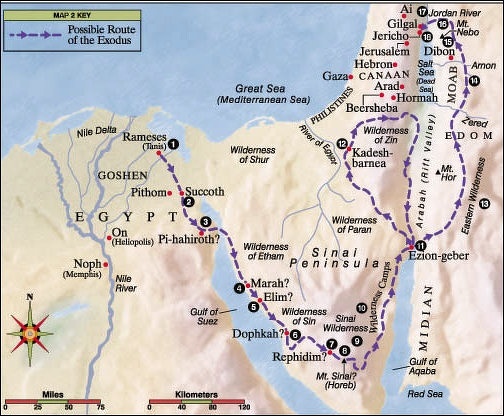
Possible Exodus route
Moses and the Parting of the Red Sea
After the Israelites left Egypt the Pharaoh changed his mind about letting the Israelites go and sent an army in pursuit of them and cornered them at the Red Sea. To allow the Israelites to escape Moses parted the Red Sea. According to the Torah, "And the Israelites went into the sea on dry ground, the waters forming a wall for them on the right and on their left." When the Egyptian chariots pursued them the waters of the Red Sea collapsed and drowned them.
To explain the parting of the Red Sea some scientists suggest that Moses passed through the swampy region near where the Suez Canal is today. They speculate that if Moses arrived at a time when a strong low tide coincided with strong winds the Red Sea might "part" enough to be crossed on foot. When the Egyptians crossed the tides ebbed and winds died, swamping the pursuers.
Adding further credence to this theory is the fact that the Hebrew phrase, “Yam Suph”, traditionally translated to "Red Sea," should actually be read as "Reed Sea." The Bitter Lakes, Lake Sirbonis (a Mediterranean lagoon now called Sabkhet el Bardowil) and Lake Manzala, where the water is shallow enough to be crossed on foot, both have lots of reeds.☼
The victory song sung after a defeat of the Egyptian cavalry resembled Canaanite poems from the 14th century B.C.
See Separate Article PARTING OF THE RED SEA AND POSSIBLE EXPLANATIONS FOR IT africame.factsanddetails.com
Jews Head Into the Wilderness
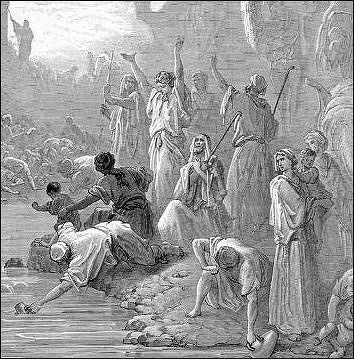
Moses strikes the rock at Horeb
Exodus 15:22 So Moses brought Israel from the Red sea, and they went out into the wilderness of Shur; and they went three days in the wilderness, and found no water. 15:23 And when they came to Marah, they could not drink of the waters of Marah, for they were bitter: therefore the name of it was called Marah. 15:24 And the people murmured against Moses, saying, What shall we drink? 15:25 And he cried unto the LORD; and the LORD shewed him a tree, which when he had cast into the waters, the waters were made sweet: there he made for them a statute and an ordinance, and there he proved them, 15:26 And said, If thou wilt diligently hearken to the voice of the LORD thy God, and wilt do that which is right in his sight, and wilt give ear to his commandments, and keep all his statutes, I will put none of these diseases upon thee, which I have brought upon the Egyptians: for I am the LORD that healeth thee. [Source: King James Version of the Bible, gutenberg.org]
15:27 And they came to Elim, where were twelve wells of water, and threescore and ten palm trees: and they encamped there by the waters. 16:1 And they took their journey from Elim, and all the congregation of the children of Israel came unto the wilderness of Sin, which is between Elim and Sinai, on the fifteenth day of the second month after their departing out of the land of Egypt. 16:2 And the whole congregation of the children of Israel murmured against Moses and Aaron in the wilderness: 16:3 And the children of Israel said unto them, Would to God we had died by the hand of the LORD in the land of Egypt, when we sat by the flesh pots, and when we did eat bread to the full; for ye have brought us forth into this wilderness, to kill this whole assembly with hunger.
16:4 Then said the LORD unto Moses, Behold, I will rain bread from heaven for you; and the people shall go out and gather a certain rate every day, that I may prove them, whether they will walk in my law, or no. 16:5 And it shall come to pass, that on the sixth day they shall prepare that which they bring in; and it shall be twice as much as they gather daily.
16:6 And Moses and Aaron said unto all the children of Israel, At even, then ye shall know that the LORD hath brought you out from the land of Egypt: 16:7 And in the morning, then ye shall see the glory of the LORD; for that he heareth your murmurings against the LORD: and what are we, that ye murmur against us? 16:8 And Moses said, This shall be, when the LORD shall give you in the evening flesh to eat, and in the morning bread to the full; for that the LORD heareth your murmurings which ye murmur against him: and what are we? your murmurings are not against us, but against the LORD.
Manna and Water from Moses’s Staff
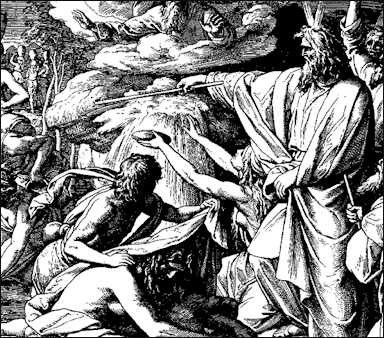
Manna After crossing the Red Sea, the Israelites could not find enough food and drink. Once when they came to some water that was too bitter to drink, Moses threw a piece of wood in the water that made it miraculously turn sweet. On another occasion God told Moses to strike a rock with his staff and water poured forth. Once when the Israelites were very hungry God dropped manna from the heaven to feed them. Manna (which means "what is it?” in Hebrew ) is described in the Bible as "a fine and flaky substance, as fine as frost on the ground. — In the famous Tintoretto painting, “Israelites Gathering Manna in the Wilderness” some of the members of the Exodus are pictured with guns.
Exodus 16:9 And Moses spake unto Aaron, Say unto all the congregation of the children of Israel, Come near before the LORD: for he hath heard your murmurings. 16:10 And it came to pass, as Aaron spake unto the whole congregation of the children of Israel, that they looked toward the wilderness, and, behold, the glory of the LORD appeared in the cloud. 16:11 And the LORD spake unto Moses, saying, 16:12 I have heard the murmurings of the children of Israel: speak unto them, saying, At even ye shall eat flesh, and in the morning ye shall be filled with bread; and ye shall know that I am the LORD your God. [Source: King James Version of the Bible, gutenberg.org]
16:13 And it came to pass, that at even the quails came up, and covered the camp: and in the morning the dew lay round about the host. 16:14 And when the dew that lay was gone up, behold, upon the face of the wilderness there lay a small round thing, as small as the hoar frost on the ground. 16:15 And when the children of Israel saw it, they said one to another, It is manna: for they wist not what it was. And Moses said unto them, This is the bread which the LORD hath given you to eat.
16:16 This is the thing which the LORD hath commanded, Gather of it every man according to his eating, an omer for every man, according to the number of your persons; take ye every man for them which are in his tents. 16:17 And the children of Israel did so, and gathered, some more, some less. 16:18 And when they did mete it with an omer, he that gathered much had nothing over, and he that gathered little had no lack; they gathered every man according to his eating. 16:19 And Moses said, Let no man leave of it till the morning.
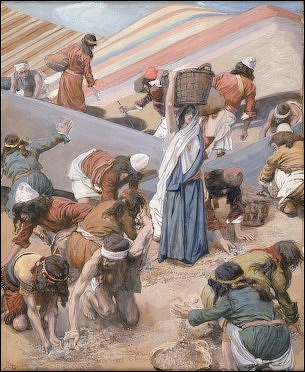
gathering manna
16:20 Notwithstanding they hearkened not unto Moses; but some of them left of it until the morning, and it bred worms, and stank: and Moses was wroth with them. 16:21 And they gathered it every morning, every man according to his eating: and when the sun waxed hot, it melted. 16:22 And it came to pass, that on the sixth day they gathered twice as much bread, two omers for one man: and all the rulers of the congregation came and told Moses.
16:23 And he said unto them, This is that which the LORD hath said, To morrow is the rest of the holy sabbath unto the LORD: bake that which ye will bake to day, and seethe that ye will seethe; and that which remaineth over lay up for you to be kept until the morning. 16:24 And they laid it up till the morning, as Moses bade: and it did not stink, neither was there any worm therein.
16:25 And Moses said, Eat that to day; for to day is a sabbath unto the LORD: to day ye shall not find it in the field. 16:26 Six days ye shall gather it; but on the seventh day, which is the sabbath, in it there shall be none. 16:27 And it came to pass, that there went out some of the people on the seventh day for to gather, and they found none. 16:28 And the LORD said unto Moses, How long refuse ye to keep my commandments and my laws? 16:29 See, for that the LORD hath given you the sabbath, therefore he giveth you on the sixth day the bread of two days; abide ye every man in his place, let no man go out of his place on the seventh day. 16:30 So the people rested on the seventh day.
16:31 And the house of Israel called the name thereof Manna: and it was like coriander seed, white; and the taste of it was like wafers made with honey. 16:32 And Moses said, This is the thing which the LORD commandeth, Fill an omer of it to be kept for your generations; that they may see the bread wherewith I have fed you in the wilderness, when I brought you forth from the land of Egypt. 16:33 And Moses said unto Aaron, Take a pot, and put an omer full of manna therein, and lay it up before the LORD, to be kept for your generations. 16:34 As the LORD commanded Moses, so Aaron laid it up before the Testimony, to be kept. 16:35 And the children of Israel did eat manna forty years, until they came to a land inhabited; they did eat manna, until they came unto the borders of the land of Canaan.16:36 Now an omer is the tenth part of an ephah.
17:1 And all the congregation of the children of Israel journeyed from the wilderness of Sin, after their journeys, according to the commandment of the LORD, and pitched in Rephidim: and there was no water for the people to drink. 17:2 Wherefore the people did chide with Moses, and said, Give us water that we may drink. And Moses said unto them, Why chide ye with me? wherefore do ye tempt the LORD? 17:3 And the people thirsted there for water; and the people murmured against Moses, and said, Wherefore is this that thou hast brought us up out of Egypt, to kill us and our children and our cattle with thirst? 17:4 And Moses cried unto the LORD, saying, What shall I do unto this people? they be almost ready to stone me. 17:5 And the LORD said unto Moses, Go on before the people, and take with thee of the elders of Israel; and thy rod, wherewith thou smotest the river, take in thine hand, and go. 17:6 Behold, I will stand before thee there upon the rock in Horeb; and thou shalt smite the rock, and there shall come water out of it, that the people may drink. And Moses did so in the sight of the elders of Israel.
Explanations for Manna and the Amalekites
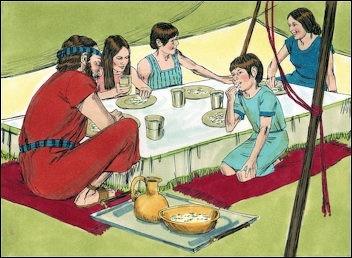
eating manna
Scientists think that manna may have been the white honey-like secretion of a plant louse that feeds on the fruit of tamarisk trees. At night it congeals into a sticky substance. During the day it melts in the sun. Bedouin still make a condiment called "manna", which is similar to the "wafers made with honey" description of manna in the Bible. Tamarisk trees grow primarily in the south, while the migration routes of the quail, another source of food, are primarily in the north.☼
At Rephidim near Mt. Sinai, the Israelites were attacked by desert people called the Amalekites. According to the Bible as Moses stood on a height and raised his arms. As long as he held out his arms victory was assured. When his arms grew tired and fell, the Amalekites advanced. To assure victory, Aaron and Hur propped up Moses's arms.
Arden tried holding his arms out as Moses had done. "After three minutes," he said, "my upper shoulders began aching sharply. Four minutes and the pain extended from shoulder to elbow. Five minutes the pain became excruciating and. Six minutes, and my arms dropped."☼
There are some who believe that Israelites who wandered in the wilderness eating manna supplied by God did not defecate Rabbinic interpretations of what happened in the wilderness maintained that as the Israelites were eating “the bread of angels” (manna) they didn’t excrete it because it was “bread that is absorbed in the limbs” (Sifré to Numbers 88). [Source: Candida Moss, Daily Beast, June 1, 2019]
Image Sources: Wikimedia, Commons, Schnorr von Carolsfeld Bible in Bildern, 1860 except Passover house, JewishChristiangay, and map, Pinterest
Text Sources: Internet Jewish History Sourcebook sourcebooks.fordham.edu “World Religions” edited by Geoffrey Parrinder (Facts on File Publications, New York); “ Encyclopedia of the World’s Religions” edited by R.C. Zaehner (Barnes & Noble Books, 1959); “Old Testament Life and Literature” by Gerald A. Larue, New International Version (NIV) of The Bible, biblegateway.com; Wikipedia, National Geographic, BBC, New York Times, Washington Post, Los Angeles Times, Smithsonian magazine, Times of London, The New Yorker, Reuters, AP, AFP, Lonely Planet Guides, and various books and other publications.
Last updated March 2024
